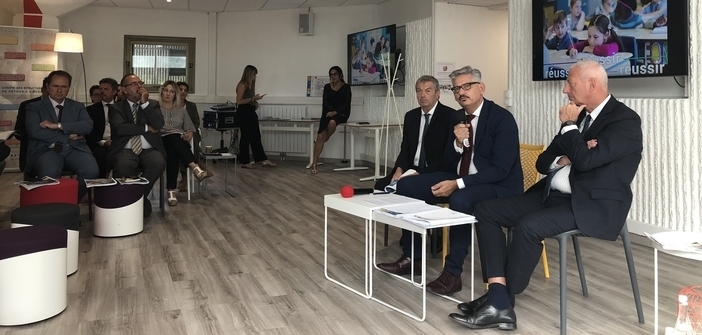This Wednesday, the Rector of the Nice Academy, Richard Laganier, wanted to meet with the press to unveil the new measures for the 2019 school year, which will be the first under his management.
Here are the main changes awaiting the student community starting next Monday.
On the eve of the pre-term start, Rector Richard Laganier announced that 2019 would be “the year of the implementation of reforms”. Both general and vocational tracks will undergo a variety of transformations. “We have many programs, but we need to connect them to perfect the academic success of our students.”
Three major measures are emerging for the 2019 school year in accordance with the law for a School of Trust enacted last July:
- Equal opportunity
- Ecological transition
- Social justice
The 2021 baccalaureate will undergo changes, such as continuous assessment in high school counting towards the baccalaureate grade. The goal is to ease the transition between secondary and higher education and better support student guidance.
The vocational route aims to obtain the “Campus of Excellence” label to restore the prestige of vocational education and apprenticeships.
In primary school, CP and CE1 classes in underprivileged neighborhoods will be reduced to a maximum of 12 students.
A language plan is launched, making the learning of modern languages mandatory from kindergarten to the end of high school. “There has been progress, but there is still a long way to go in this area,” explains the rector.
Education for children aged 3 is now mandatory to combat social inequalities and strengthen the transition to primary school.
Since September 2018, the inclusive school service has supported students with disabilities and their families. This area will be further strengthened for the 2019 school year.
A Universal National Service is being established. Still at the experimental stage, this initiative aims to transmit republican values, strengthen social cohesion, promote a culture of commitment, and finally support students’ professional integration.
The focus on ecological transition involves implementing a sustainable project in each institution of the Nice Academy. The idea is to involve students by appointing an eco-delegate in each class. This measure aims to tackle waste. Moreover, an academic prize will reward initiatives.
As part of the poverty plan, the Academy is committed to providing a free breakfast in establishments in priority areas. A measure labeled as “a sign of solidarity and fraternity” by Mr. Laganier, aligning with social justice measures.
Finally, displaying republican values will “allow students to reflect on their significance and enable teachers to work around these values,” concludes the rector.


